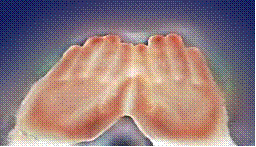





Published on Feb 21, 2020
An individual first rests his wrist, and on some devices, the middle of his fingers, on the sensor's supports such that the palm is held centimeters above the device's scanner, which flashes a near-infrared ray on the palm.
Unlike the skin, through which near-infrared light passes, deoxygenated hemoglobin in the blood flowing through the veins absorbs near-infrared rays, illuminating the hemoglobin, causing it to be visible to the scanner. Arteries and capillaries, whose blood contains oxygenated hemoglobin, which does not absorb near-infrared light, are invisible to the sensor. The still image captured by the camera, which photographs in the near-infrared range, appears as a black network, reflecting the palm's vein pattern against the lighter background of the palm.
An individual's palm vein image is converted by algorithms into data points, which is then compressed, encrypted, and stored by the software and registered along with the other details in his profile as a reference for future comparison. Then, each time a person logs in attempting to gain access by a palm scan to a particular bank account or secured entryway, etc., the newly captured image is likewise processed and compared to the registered one or to the bank of stored files for verification, all in a period of seconds. Numbers and positions of veins and their crossing points are all compared and, depending on verification, the person is either granted or denied access.
The completely contactless feature of this Device makes it suitable for use where high levels of hygiene are required It also eliminates any hesitation people might have about coming into contact with something that other people have already touched.
In addition to being contactless and thereby hygienic and user-friendly in that the user does not need to physically touch a surface and is free of such hygiene concerns, palm vein authentication is highly secure in that the veins are internal to the body and carry a wealth of information, thereby being extremely difficult to forge.

There may be a chance that the palm we had registered may get damaged then we cannot use this technology, so during the time of registration we take the veins of both the hands so that if one gets damaged we can access through the second hand. When hand get damaged up to large extent we can get veins because deeper into the hand veins are obtained. When we apply this method we can maintain complete privacy .
On the basis of testing the technology on more than 70,000 individuals , Fujitsu declared that the new system had a false rejection rate of 0.01% (i.e., only one out of 10,000 scans were incorrect denials for access), and a false acceptance rate of less than 0.00008% (i.e., incorrect approval for access in one in over a million scans). Also, if your profile is registered with your right hand, don't log in with your left - the patterns of an individual's two hands differ. And if you registered your profile as a child , it'll still be recognized as you grow, as an individual's patterns of veins are established in utero (before birth). No two people in the world share a palm vein pattern - even those of identical twins differ . In addition the devices ability to perform personal authentication was verified using the following:
1. Data from people ranging from 6 to 85 years old including people in various occupations in accordance with the demographics realized by the Statistics Center of the Statistics Bureau.
2. Data about foreigners living in Japan in accordance with the world demographics released by the united nations.
3. Data taken in various situations in daily life including gafter drinking alcohol, taking a bath, going outside and waking up.
Palm vein pattern authentication technology developed by Fujitsu was being used in a wide range in Japan. If this technology is introduced in our country we can solve many problems such as password protection in ATM, security in various fields and if we implement this technology in government offices we can make the employees to work according the government timings. Surely this technology will bring a revolution in the field of science and technology in the near future.
1. WWW.ZENGINKYO.OR.JP/EN/NEWS/INDEX
2. www.btm.co.jp/english/index.html
3. WWW.networkworld.COM
| Are you interested in this topic.Then mail to us immediately to get the full report.
email :- contactv2@gmail.com |